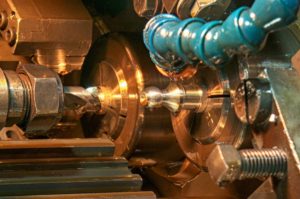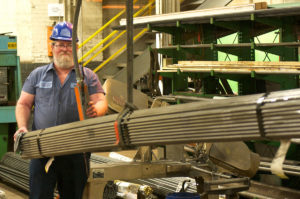Working with experts at a job shop for metal machined parts offers many benefits. Some of these benefits are clear from the outset, while others might need further examination. Whether you are working with large volumes, small runs, or prototypes, there are many benefits to working with the right job shop. Let’s take a look at a few of the reasons to use a job shop for metal machined parts.
7 Reasons to Use a Job Shop for Metal Machined Parts
1. No Equipment Costs
The right milling, turning, screw machines and other equipment for metal machined parts requires substantial investment. High-quality CNC mills with even the simplest configurations cost over $50,000 for a single machine. And you’re unlikely to use just one machine for your machined parts. One of the first and most obvious reasons to use a job shop for metal machined parts is there’s no upfront investment required on your part—the machine shop tackles this for you.
2. No Training Costs
Even the most advanced equipment isn’t very useful without people who know how to use it. Proper training is essential to not only produce a high-quality product, but also to protect employees from hazards. Training employees to use machine shop equipment takes time. However, machine shop clients don’t have to worry about this aspect of the job.
3. Work With Experts
The right training will show someone how to use advanced milling, turning, or similar machines, but it’s experience that allows them to produce exceptional products at great speed. Working with experts at a machine shop, you can rest assured that your project is in good hands. Look for a job shop that has experience working with your products and materials, so there’s no trial-and-error phase.
4. Reduce Liability
Metalworking equipment poses some obvious hazards. Workers who don’t know how to use or install these machines properly can be exposed to serious risk. Machine shops protect themselves and their workers with the right insurance and employee benefits, as well as training to ensure a safe workplace. Working with a job shop for metal machined parts, you don’t have to take on any of this liability yourself.
5. Design Assistance
There are often multiple ways to machine a part, but usually one way that is most efficient in terms of materials and time. Making one or two small changes to a design can make the machining process more efficient and save thousands of dollars in the long run. With CNC machining, it’s easy to make small changes to a design and then produce an accurate prototype or product. A design expert knows how to make these changes and make your parts with maximum efficiency.
6. Existing Partnerships
Whether you are working with stainless steel, nickel alloys, titanium alloys or another metal, stock metals are expensive. Existing partnerships with suppliers can help you save money, but these take time and effort to forge. Instead of forging these partnerships yourself with stock suppliers, work with a job shop that already has strong supplier relationships.
7. Get the Latest Tech
Job shops specialize in machining services and they have the resources and expertise to get the latest equipment for the job. When you find a job shop that specializes in what you do, you can take advantage of the latest equipment and techniques for doing it. This ultimately means your parts can be created faster, with fewer errors and with the highest level of precision.
There are many reasons to use a job shop for metal machined parts. The right job shop will have the equipment and experience necessary to complete your job quickly and within a reasonable budget. If you have questions about metal machined parts for an upcoming project, get in touch. We’d be happy to tell you more about our job shop, our expertise, design assistance, and more.



 Toll Manufacturer
Toll Manufacturer This type of manufacturer is the body that owns the plant and machinery and provides the labor to operate the machinery – similar to a toll manufacturer. You would have access to the company’s resources (plant, machinery and machinists) to make your parts and components, and you ultimately assume the risk of selling the goods. Similarly, a contract manufacturer would also be paid on a routine basis.
This type of manufacturer is the body that owns the plant and machinery and provides the labor to operate the machinery – similar to a toll manufacturer. You would have access to the company’s resources (plant, machinery and machinists) to make your parts and components, and you ultimately assume the risk of selling the goods. Similarly, a contract manufacturer would also be paid on a routine basis. A full-fledge manufacturer is the most involved of the three types. This company is responsible for providing the space, machinery and team to manufacture the parts, as well as, all materials and goods necessary for production. Ultimately, this type of manufacturer assumes all risks associated with selling the products and has rights to intangible assets such as designs and patents.
A full-fledge manufacturer is the most involved of the three types. This company is responsible for providing the space, machinery and team to manufacture the parts, as well as, all materials and goods necessary for production. Ultimately, this type of manufacturer assumes all risks associated with selling the products and has rights to intangible assets such as designs and patents. Customer-Centric Approach
Customer-Centric Approach